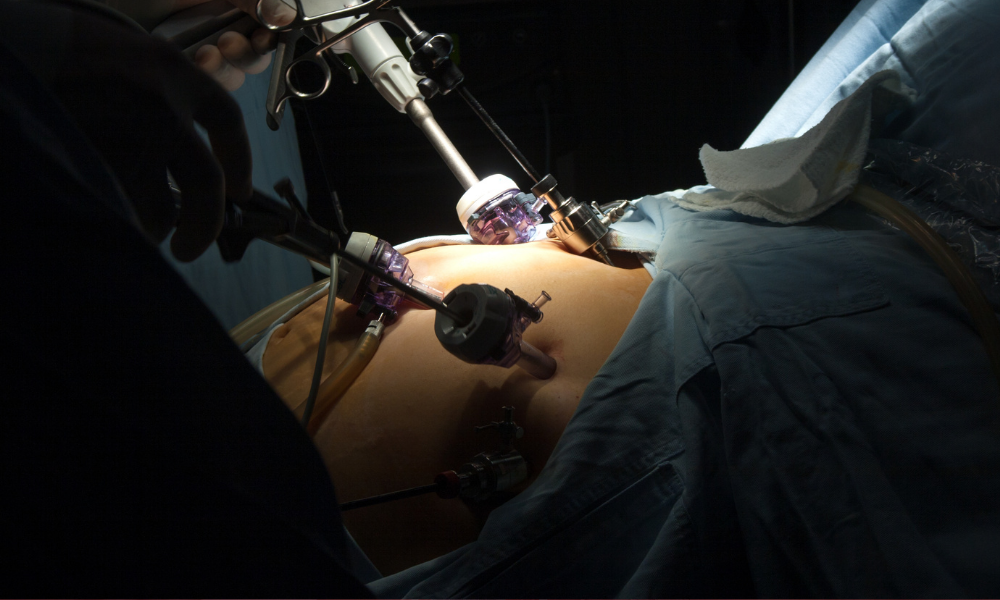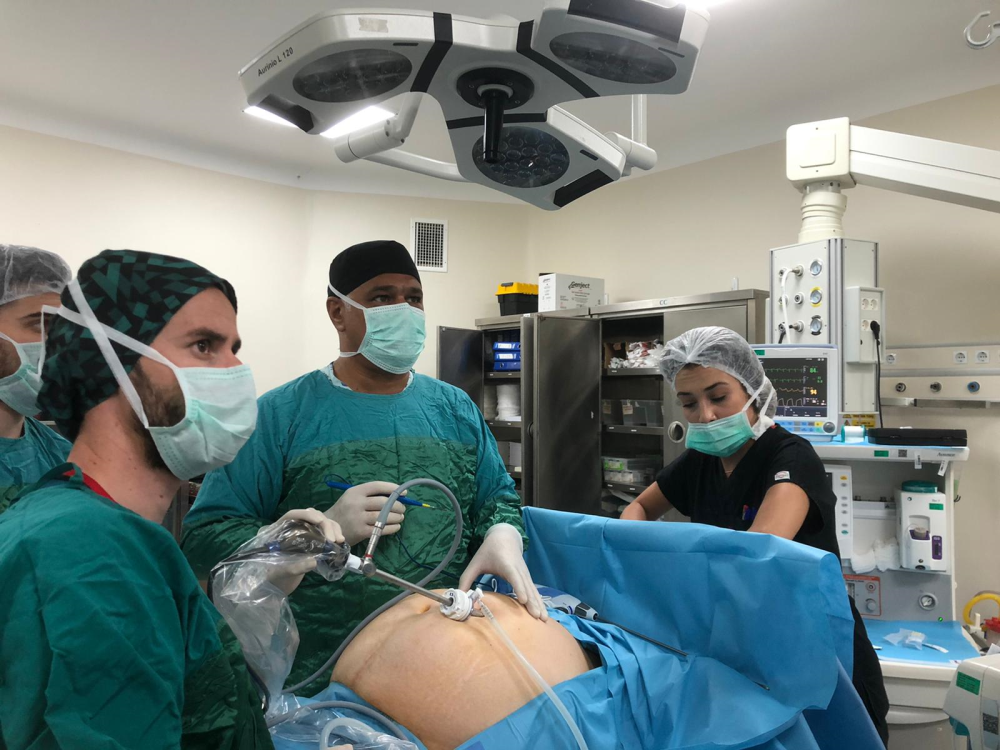Bariatric surgery is a serious step in the fight against obesity. They are designed to help people who are severely overweight to lose weight when other methods such as diet and exercise have not worked. There are various surgical methods for this type of procedure, such as gastric bypass, gastric sleeve and gastric banding. These procedures reduce the size of the stomach or alter the digestive tract.
As a result, you feel full more quickly and eat less. The aim is long-term weight loss to improve health and quality of life. Each method has its own advantages and disadvantages that need to be considered. Before deciding on bariatric surgery, a comprehensive consultation with a specialist is essential.
Different types of bariatric surgery
There are various options for bariatric surgery – not everything suits everyone. The most common techniques are
1. gastric banding: a band is placed around the upper part of the stomach, which makes you feel full more quickly.
2. gastric sleeve: A large part of the stomach is removed. What remains is a narrow stomach tube.
3. gastric bypass: the stomach is made smaller and connected directly to the small intestine. Food thus bypasses a large part of the stomach.
4. biliopancreatic diversion: Similar to gastric bypass, but more of the small intestine is bypassed.
Each method has its pros and cons, depending on your body and your goals. Discuss it thoroughly with your doctor to find the best option for you.
Important prerequisites for bariatric surgery
Bariatric surgery is not simply a quick fix for obesity. There are clear requirements that must be met before you can be considered for such surgery. First, your body mass index, or BMI, should be at least 35, or you have a BMI over 30 and also have serious health problems related to your weight, such as diabetes or high blood pressure.
Another key point is understanding that this procedure requires a serious commitment to a permanent lifestyle change. You must be prepared to make fundamental changes to your diet and integrate regular exercise into your daily routine. In addition, doctors will usually conduct a thorough evaluation of your mental health to ensure that you are mentally prepared for the challenges you will face after surgery. Your commitment to the process and aftercare will also play an essential role. It’s not just a surgery, it’s the beginning of a lifelong journey to better health and well-being.
Preliminary examinations and consultations before the operation
Before you embark on the path of bariatric surgery, you will need to undergo a series of pre-examinations and consultations. These are designed to assess your general health and ensure that you are suitable for the procedure. First, you will have a detailed consultation with a specialist doctor to discuss your medical history and weight loss goals. This will be followed by investigations such as blood tests, ultrasound scans, a cardiovascular check and, if necessary, further diagnostic tests to assess your fitness for surgery. Nutritional counseling will also help you prepare for the lifestyle changes you will need to make after surgery. It is important to take this phase seriously and attend all appointments, as it lays the foundation for the success of your treatment.

Possible risks and side effects
Bariatric surgery often leads to successful weight loss, but it is not without risks and side effects. Complications can occur immediately after surgery or in the long term. Typical short-term risks include infection, bleeding and thrombosis. Long-term challenges include nutritional deficiencies, as the body is no longer able to properly absorb essential vitamins and minerals after surgery. This can lead to fatigue, hair loss and bone problems.
It can also lead to so-called dumping symptoms, when food enters the small intestine too quickly, which can lead to nausea and dizziness. It is crucial to discuss and weigh up these risks with your doctor before making a decision.
Diet and lifestyle changes before surgery
Before bariatric surgery, it is crucial to review and adjust your dietary habits. The body needs to be prepared for the significant changes after surgery, and diet plays a central role in this. You will likely need to follow a pre-operative diet aimed at reducing the size of your liver and minimizing the risk of surgery. This may include avoiding sugary drinks, cutting down on carbohydrate-rich foods and eating more protein. Drinking plenty of water is also recommended.
Another important point is to prepare for the change in diet after the operation. You must learn to eat smaller portions and chew thoroughly. It is also necessary to get used to living without certain foods that are not well tolerated after the operation. The exact instructions will vary depending on the doctor treating you and the type of surgery, but incorporating exercise into your daily routine and switching to healthier eating habits are essential steps to benefit from bariatric surgery in the long term.
The bariatric surgery procedure
Bariatric surgery is a serious procedure to help with severe obesity. Most often, this surgery is performed when dieting and exercise do not produce the desired results. Your surgeon will advise you in advance to ensure that you are a suitable candidate. On the day of surgery, you will be taken to the operating room, and the procedure is usually performed under general anesthesia. Depending on the procedure – such as gastric bypass or sleeve gastrectomy – the surgeon will adjust your stomach size to restrict food intake.
The operation takes a few hours and after a recovery period in the recovery room, you will remain in hospital for a few days for monitoring. You will be supported by a team of doctors, dieticians and physiotherapists to help you start a new, healthier life. Recovery times can vary, but many patients report a noticeable improvement in their quality of life after recovery.
Aftercare and recovery after surgery
After bariatric surgery, an important part of your journey begins: the recovery and aftercare phase. This phase is crucial to the success of your weight loss and long-term health. You will spend some time in the hospital, usually between 2 and 5 days, depending on your individual recovery and the specific surgical procedure. After this, it is important to follow your doctor’s instructions carefully. These include a special diet, starting with liquids and then gradually introducing solid foods, regular exercise and possibly taking vitamins and mineral supplements.
In the first weeks and months, close cooperation with nutritionists, psychologists and support groups is also of great importance in order to consolidate the new lifestyle habits. Be aware that full recovery and adaptation to your new lifestyle can take up to 12 months. Any physical activity should be built up slowly and under guidance to avoid overexertion. Eat mindfully, chew thoroughly and listen to your body. While aftercare can be challenging, it is an essential step on the road to a healthier you.
Long-term effects and success of bariatric surgery
Bariatric surgery is not a quick fix. They are life-changing in the long term and come with risks and benefits. Success rates vary, but studies show that many patients lose weight permanently. Typically, they lose about 60 to 80 percent of their excess weight in the first 18 to 24 months after surgery. Many also see an improvement in comorbidities such as type 2 diabetes or high blood pressure.
But beware, a healthy diet and exercise remain essential for success. Without this commitment, old habits can return and weight can increase again. Long-term effects can also include nutritional deficiencies, so good aftercare is important. If you adopt the new lifestyle, bariatric surgery can be an effective solution.

Frequently asked questions and final thoughts on bariatric surgery
Many people face bariatric surgery and have countless questions on their minds. Is the procedure safe? How long is the recovery time? What can I eat after the operation? Understandably, you are looking for clarity.
First, safety – bariatric surgery is generally safe. They are proven methods of weight loss. Recovery time can vary, usually you’ll be back on your feet in about 2 to 4 weeks. As for your diet, expect a strict diet after surgery. Your stomach is smaller, which means eating smaller portions and avoiding certain foods.
Simply put, bariatric surgery is not a miracle cure. It’s a powerful tool that goes hand in hand with commitment and lifestyle changes. Think carefully, prepare yourself and work closely with your doctor to make the most of your decision.
Op. Dr. Volkan Arayıcı
info@volkanarayici.com
+90 532 466 67 67
Please visit our blog page to read our other articles that will help you on your weight loss journey. You may also be interested in the posts we share on our Instagram page.









